
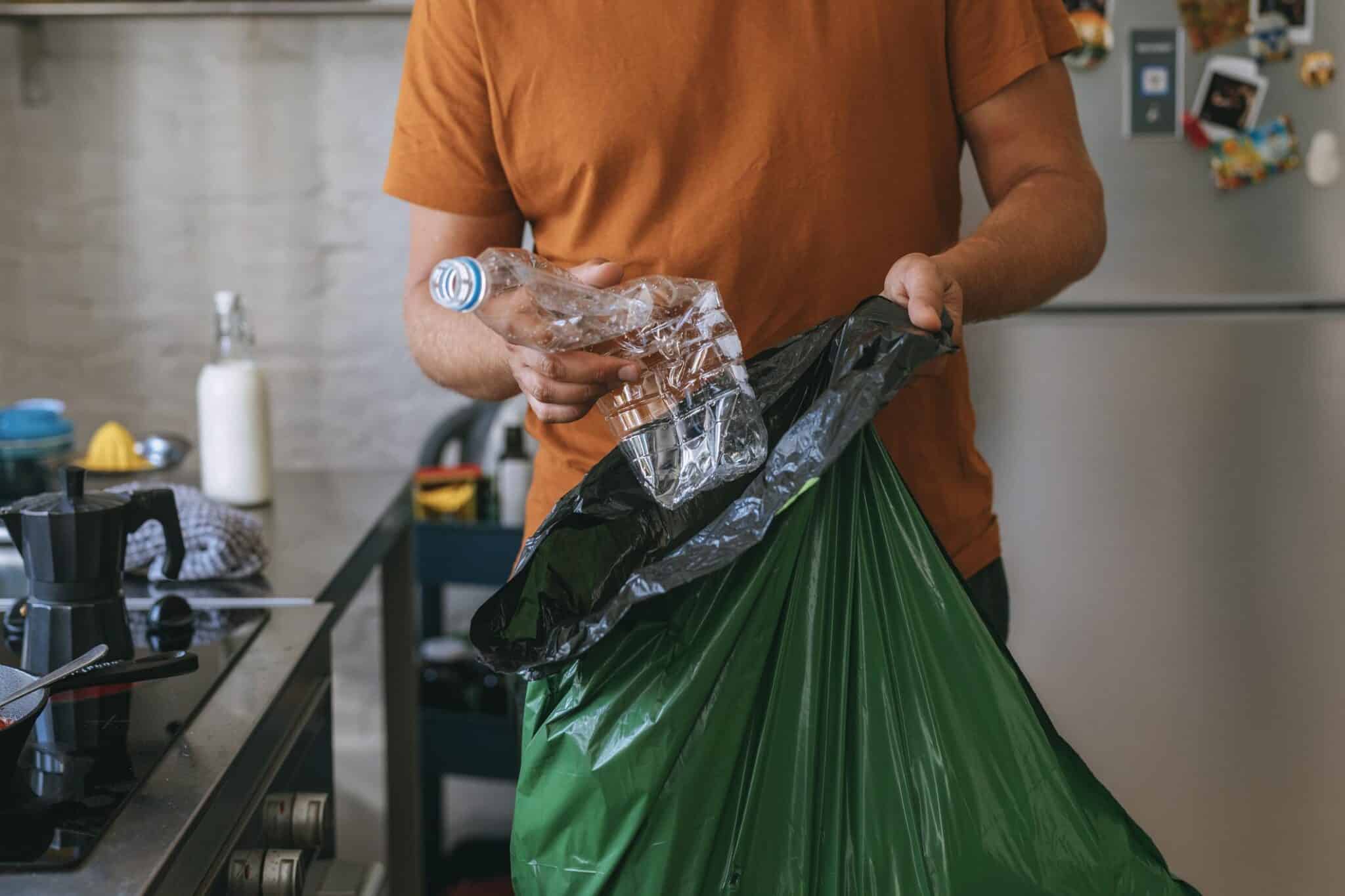
miniseries / Getty Images
As consumers become more aware of issues like ocean plastics and overflowing landfills, many are looking for ways to cut down on their environmental footprints. An easy way to make your home more sustainable is to switch from heavy-duty plastic trash can liners to biodegradable garbage bags. While they aren’t a perfect solution, they have a few key advantages over their traditional counterparts.
Whether you’re looking for tall kitchen trash bags or a smaller option to line your countertop compost bin, in this article, we’ll review five of the best biodegradable garbage bags on the market today.
Our Picks for the Top Biodegradable Garbage Bags
Each product featured here has been independently selected by the writer. Learn more about our review methodology here. If you make a purchase using the links included, we may earn a commission.
- Best Overall: UNNI ASTM D6400 100% Compostable Trash Bags
- Best Bulk Buy: Reli. BioGrade 13 Gallon Trash Bags
- Best Small Bags: BioBag Compostable Countertop Food Scrap Bags
- Best Biodegradable Kitchen Bags: Hippo Sak Plant-Based Tall Kitchen Bags
- Best for Fast Decomposition: STOUT by Envision EcoSafe Compostable Bags
Why Switch to Biodegradable Garbage Bags?
According to the Center for Biological Diversity, a plastic bag takes 1,000 years to degrade in a landfill. And when bags do decompose, they can leach toxins and microplastics into the environment. It’s difficult to completely abandon plastic, but we can take simple steps toward reducing our environmental footprints by switching to products such as biodegradable garbage bags.
Although compostable and biodegradable plastics take longer to break down in a landfill than they would in an open environment, they can still be more eco-friendly than using traditional plastic bags. Below are some reasons you may consider replacing your plastic trash bags with more eco-friendly alternatives:
- Biodegradable bags produce fewer greenhouse gas emissions over their lifetime because the plants they’re made from (often corn or sugarcane) absorb carbon while growing. This offsets the carbon they produce when breaking down. One study even found that switching to corn-based bioplastics could cut U.S. greenhouse gas emissions by up to 25%.
- Biodegradable and compostable trash bags break down up to 1,000 times faster than regular garbage bags in the right environments. Biodegradable bags start their decomposition process when exposed to moisture or organisms such as bacteria and fungi. Compostable bags break down at a faster rate than conventional bags as well, but they usually require high heat to break down, so they should be disposed of at commercial composting facilities.
- Compostable bags will break down fully and will not turn into microplastics like traditional plastics and the bioplastics in some biodegradable plastic bags will.
There are also some downsides to bioplastics. For example, they require more land, water and pesticides to grow the crops that are turned into the bioplastics. They can also be much more expensive and can release methane if not exposed to enough oxygen during the decomposition process. However, most modern landfills in the U.S. are air-locked to prevent these and other harmful gasses from entering the atmosphere.
Considering both sides of the coin, is it worth switching to biodegradable garbage bags? According to Kartik Chandran, a professor in the Earth and Environmental Engineering Department at Columbia University, compared to traditional plastics, “bioplastics are a significant improvement.” But the choice is ultimately up to you.
Of course, the most sustainable option would be to produce less waste in the first place, tossing your garbage in a bin without a liner and washing the bin after you dump your loose trash. Composting food scraps is another way to reduce your landfill contribution whether you’re in a house or an apartment.
5 Best Biodegradable Trash Bags
If you decide to purchase biodegradable trash bags, it’s important to note that not all biodegradable trash bags actually break down within a reasonable amount of time. Depending on its material, the claim that a bag is biodegradable can be little more than greenwashing.
In order to provide you with sustainable recommendations, when choosing the top biodegradable garbage bags, we looked at factors including:
- Composition: What materials go into the bags themselves? Are they plant-based? Do they have Environmental Products, Inc. (EPI) chemical additives to accelerate plastic degradation?
- Certifications: Are the bags certified to American Society for Testing and Materials (ASTM) standards for composting and biodegrading?
- Decomposition rate: How long does each company’s bags take to decompose? (This can range from six months to over a year, depending on the brand.)
- Durability: Do the bags have the same strength as traditional trash bags? Or do they tear or leak easily?
- Packaging: Do the products have compact and recyclable packaging?
- Customer satisfaction: Are customers satisfied with the products? (We look at verified reviews as well as have conducted our own independent reviews on select products).
Best Overall: UNNI ASTM D6400 100% Compostable Trash Bags
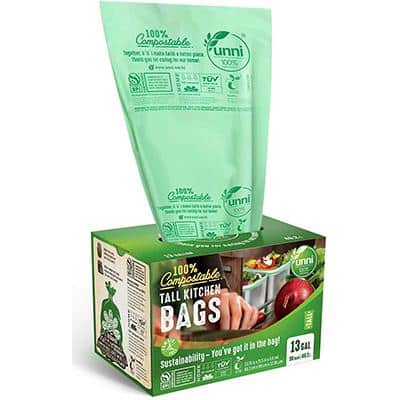
www.unni.world
UNNI garbage bags are our best overall choice because they are 100% biodegradable and compostable. The eco-friendly bags are also certified by the Biodegradable Products Institute and OK Compost Home and are BPA-free. They are made entirely from corn starch and other plant starches and contain no polyethylene. Within 180 days, the bags will degrade into organic compounds such as CO2 and O2. The brand also makes drawstring waste bags and small trash bags for home composting and pet waste.
Customer Rating: 4.5 out of 5 stars with over 4,400 Amazon ratings
Why Buy: These compostable trash bags come in plenty of sizes and styles, so whether you need to dispose of dog poop or food scraps, you can find an eco-friendly bag from UNNI.
Best Bulk Buy: Reli. BioGrade 13 Gallon Trash Bags
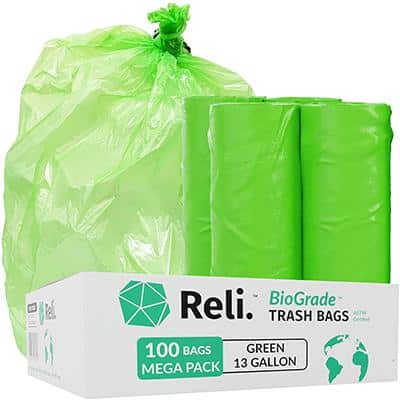
shopreli.com
Trusted for over 30 years, the bright green Reli. biodegradable garbage bags are designed for ease of use and durability. They have a star-sealed bottom to prevent breakage and are made with a high-density blend of plant-based materials and EPI chemical additives. The company sells compostable bags as well for those who have access to a composting facility, and the 13-gallon bags come in a compact cardboard box that can be recycled.
Customer Rating: 4.4 out of 5 stars with over 250 Amazon ratings
Why Buy: These biodegradable trash bags are eco-certified to ASTM D6954 standards and include EPI additives to ensure a faster degradation process. You can also lower your carbon footprint even more by buying in bulk and purchasing an 800-count package for .
Best Small Bags: BioBag Compostable Countertop Food Scrap Bags
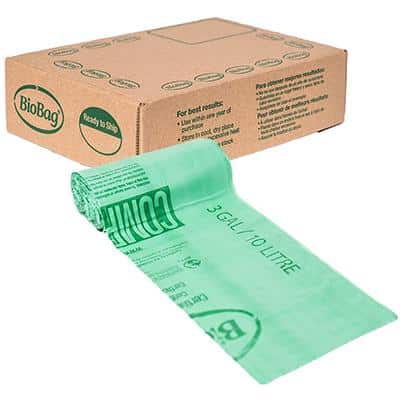
www.biobagusa.com
BioBag Compostable Countertop Food Scrap Bags are made up of a bioplastic resin blend called Mater-Bi®, which uses non-genetically modified plant-based substances like corn starch and a variety of biodegradable/compostable polymers. BioBags has made a commitment to use as many renewable resources in its products, and its bags are manufactured in the U.S. with resin sourced from Italy. They are stored in a small cardboard package that can be recycled after use.
Customer Rating: 4.7 out of 5 stars with over 3,200 Amazon ratings
Why Buy: These small bags are extremely versatile and can be used for small waste needs all around the home. BioBag’s products are certified compostable and biodegradable according to European standard EN 13432, U.S. standards ASTM D6400 and OK Compost Home, and Australian standard AS 4736.
Best Biodegradable Kitchen Bags: Hippo Sak Plant-Based Tall Kitchen Bags
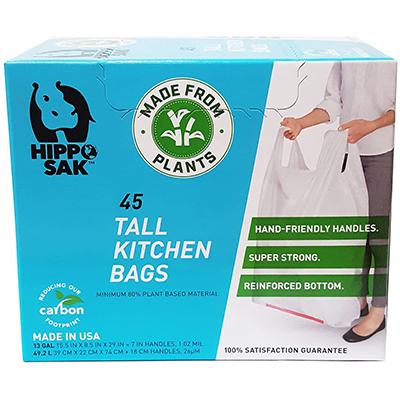
www.hipposak.com
Hippo Sak tall kitchen bags are made in the USA from at least 88% plant-based materials such as sugarcane rather than fossil fuels. These white trash bags are extremely durable with a slightly thicker layer on the bottom to prevent breakage. The kitchen bags also have large handles that make them easy to grip, pick up and replace without the fear of tearing. They are packaged in a small cardboard box with a large tab that makes it easy to pull individual bags out.
Customer Rating: 4.9 out of 5 stars with over 5,700 Amazon ratings
Why Buy: Hippo Sak garbage bags are USDA Certified Biobased Products, are completely recyclable and are BPA-free. They have an extremely high satisfaction rate and have been said by buyers to be extremely durable.
Best for Fast Decomposition: STOUT by Envision EcoSafe Compostable Bags
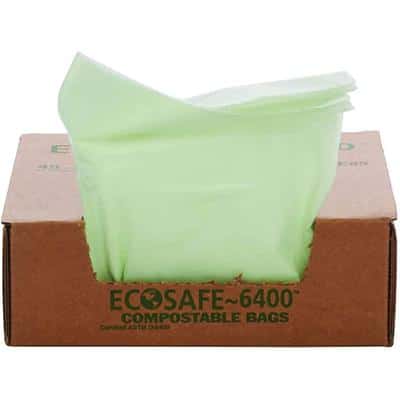
Envision
The STOUT by Envision EcoSafe Compostable Bags are specifically designed for collecting organic waste. Even though the average decomposition rate for biodegradable and compostable bags can range from six months to a year in an open environment, STOUT bags are said to decompose in 10 to 45 days and biodegrade in a maximum of six months in commercial composting facilities. Much like the other brands, these garbage bags come in compact cardboard packaging for easy recycling. A star seal on the bottom of the bag makes it possible to carry more weight without leaking or ripping.
Customer Rating: 4.7 out of 5 stars with over 500 Amazon ratings
Why Buy: These fast-decomposing bags are made in the U.S. by blind or visually impaired citizens. They’re also USCC and BPI certified and meet the requirements of ASTM D6400.
Frequently Asked Questions: Biodegradable Trash Bags
Which garbage bags are biodegradable?
Garbage bags made from bioplastics or other plant-based starches and materials are considered biodegradable. Bioplastics are a mixture of organic materials that mimic the properties of traditional petroleum-based plastics. Some bioplastics include additives to speed up the deterioration process. Some bioplastics are so complex that they aren’t considered biodegradable anymore. This is why it is important to make sure your products are not only composed of plant material, but are also certified biodegradable.
Are biodegradable bags better than plastic?
Biodegradable garbage bags produce fewer greenhouse gas emissions than traditional plastic bags. However, it takes more land, water and pesticides to grow the plant materials the bags are made from. Overall, researchers have stated that biodegradable bags are better, but they don’t break down significantly faster in landfills.
How long do biodegradable bags take to decompose?
The range for the decomposition of biodegradable bags is different for each brand. Some state that it only takes 180 days for decomposition, while for others it may be up to a year and a half. It also depends on the environment the bag is in — in a commercial composting facility or at home in an open environment, decomposition will be significantly faster than in an air-locked landfill. Generally, no matter the time it takes for biodegradable garbage bags to decompose, it takes traditional garbage bags longer.

 233k
233k  41k
41k  Subscribe
Subscribe 